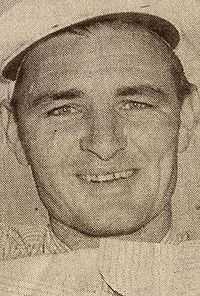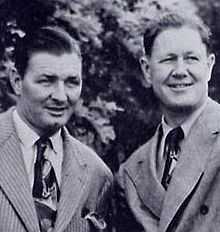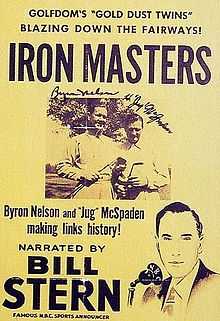Harold "Jug" McSpaden
| Harold "Jug" McSpaden | |
|---|---|
| — Golfer — | |
 McSpaden in 1938 | |
| Personal information | |
| Full name | Harold Lee McSpaden |
| Nickname | Jug |
| Born |
July 21, 1908 Monticello, Kansas |
| Died |
April 22, 1996 (aged 87) Kansas City, Kansas |
| Nationality |
|
| Career | |
| Turned professional | 1927 |
| Former tour(s) | PGA Tour |
| Professional wins | 25 |
| Number of wins by tour | |
| PGA Tour | 17 |
| Best results in Major Championships | |
| Masters Tournament | T4: 1947 |
| U.S. Open | T7: 1931 |
| The Open Championship | DNP |
| PGA Championship | 2nd: 1937 |


Harold Lee "Jug" McSpaden (July 21, 1908 – April 22, 1996) was an American professional golfer.
Early career
Born in Monticello, Kansas, McSpaden became interested in golf at the age of ten, after seeing Harry Vardon play in Kansas City, Kansas. McSpaden worked as a caddie, then was elected to PGA Membership at age 18 on November 11, 1926. He played in the first Masters in 1934 and won the Pasadena Open in 1935; the Canadian Open in 1939; and both the Los Angeles Open and the Phoenix Open in 1944 (his only head-to-head win against Byron Nelson). In the late 1930s and early 40s McSpaden was the club pro at Winchester Country Club outside of Boston.
In 1938, McSpaden played in the second Bing Crosby Pro-Am and was partnered with Eddie Lowery, who had been the caddy of Francis Ouimet in the 1913 U.S. Open. In 1939, McSpaden set a record at the Brackenridge Park Golf Course in San Antonio, when he shot a 59 in a practice round before the Texas Open.
Ryder Cup teams during World War II
McSpaden was named to the U.S. Ryder Cup team in 1939, but the event was cancelled that year due to the outbreak of World War II. Other members of the Ryder Cup team that year included: Byron Nelson, Ralph Guldahl, Paul Runyan, Dick Metz, Craig Wood, Horton Smith, Walter Hagen, Sam Snead, and honorary captain Vic Ghezzi. McSpaden was also a member of the Ryder Cup team in 1941, 1942, and 1943; but during those years only exhibition matches were played as fundraisers for the war effort. Between 1942 and 1944 McSpaden and Byron Nelson (both of whom were rejected from the military for health reasons) made 110 exhibition appearances for the Red Cross and USO.
Because of their consistent one-two finishes at these charity events, Nelson and McSpaden were together referred to as the "Gold Dust Twins". In 1944, when winners were paid in war bonds, McSpaden won $23,855. He claimed to have cleared less than $150 when he cashed them in. McSpaden's winnings that year were second only to Nelson's record-breaking $37,967 worth of bonds.
In 1938, McSpaden and Byron Nelson complained to and then worked with a shoe manufacturer, Field and Flint, to improve the comfort and grip of golf shoes. For a time, they each received a 25 cent royalty for each pair of shoes sold.
McSpaden and Nelson were the subject of "Iron Masters", a 1940s newsreel narrated by Bill Stern.
Retirement and records
In 1947, McSpaden became vice president of a sportswear company, the Palm Beach Company, and left the professional golf tour.
McSpaden was elected to the Professional Golfers' Association Hall of Fame, and the Kansas Golf Hall of Fame on September 30, 1991. He was the course architect for the Dub's Dread Golf Club in Kansas City, Kansas. He competed in the Senior PGA Championship until the age of 85.
While McSpaden had 17 PGA Tour wins in all, he holds a PGA record for coming in second: 13 times in one year, 1945. That same year, he set a PGA record of 31 top-10 finishes in one season. He finished 12 times in the top-10 at major championships. His best finish was runner-up to Denny Shute at the 1937 PGA Championship.
McSpaden was the first pro-golfer to shoot a 59 on a par 71 course (Brackenridge Park Golf Club, San Antonio, Texas) in 1939. His playing partners that day were Byron Nelson, Paul Runyan, and Ben Hogan.
McSpaden also holds the PGA record for being the oldest golfer ever to better his age in a Champions Tour event: in 1994 he shot an 81 at the age of 85 in Palm Beach Gardens, Florida.
According to Byron Nelson, McSpaden was "a better player than most people know". He was "honest, forthright, kind of rough and gruff", and because of his "exceptionally long arms" only used a 42-inch driver for most of his career.
McSpaden was named the 1994 Nissan Open Tournament Honoree, having won there (then the Los Angeles Open), in 1944.
In 1995, McSpaden said to Byron Nelson, "If you wouldn't have been born, I'd have been known as a pretty good player."
Death and legacy
McSpaden died in Kansas City, Kansas on or around April 22, 1996. He and his wife were found dead in their home located on Painted Hills Golf Course. At the time the course was named Victory Hills. Their car had been left running in the attached garage. The police ruled the deaths accidental carbon monoxide poisonings.
In both 2004 and 2005, McSpaden was a candidate on the ballot for the World Golf Hall of Fame. However, in neither vote did he receive enough support to become an inductee.
Dub's Dread, the course McSpaden designed, was once listed in the Guinness Book of World Records as the world's longest golf course.
Professional wins
PGA Tour wins (17)
- 1933 (1) Santa Monica Amateur-Pro
- 1934 (1) Pasadena Open
- 1935 (2) Sacramento Open, San Francisco Match Play
- 1936 (1) Massachusetts Open
- 1937 (1) Massachusetts Open
- 1938 (2) Miami Open, Houston Open
- 1939 (1) Canadian Open
- 1941 (1) Thomasville Open
- 1943 (1) All American Open
- 1944 (5) Los Angeles Open, Phoenix Open, Gulfport Open-Mississippi, Chicago Victory Open, Minneapolis Four-Ball (with Byron Nelson)
- 1945 (1) Miami International Four-Ball (with Byron Nelson)
Other wins (8)
- 1931 Oklahoma Open
- 1934 Oklahoma Open, Iowa Open
- 1940 Philippine Open
- 1938 Massachusetts Open
- 1941 Massachusetts Open
- 1942 Miami Open
- 1944 Utah Open
Results in major championships
| Tournament | 1928 | 1929 |
|---|---|---|
| Masters Tournament | NYF | NYF |
| U.S. Open | CUT | DNP |
| PGA Championship | DNP | DNP |
| Tournament | 1930 | 1931 | 1932 | 1933 | 1934 | 1935 | 1936 | 1937 | 1938 | 1939 |
|---|---|---|---|---|---|---|---|---|---|---|
| Masters Tournament | NYF | NYF | NYF | NYF | T7 | T19 | T15 | 32 | T16 | T12 |
| U.S. Open | DNP | DNP | T40 | CUT | DNP | CUT | T18 | T20 | T16 | T9 |
| PGA Championship | DNP | DNP | DNP | DNP | DNP | DNP | QF | 2 | R32 | R64 |
| Tournament | 1940 | 1941 | 1942 | 1943 | 1944 | 1945 | 1946 | 1947 | 1948 |
|---|---|---|---|---|---|---|---|---|---|
| Masters Tournament | T17 | T9 | T18 | NT | NT | NT | T29 | T4 | 33 |
| U.S. Open | T12 | T7 | NT | NT | NT | NT | T31 | DNP | T12 |
| PGA Championship | SF | R16 | R16 | NT | QF | R32 | SF | R64 | DNP |
Note: McSpaden never played in The Open Championship.
NYF = Tournament not yet founded
NT = No tournament
DNP = Did not play
CUT = missed the half-way cut
R64, R32, R16, QF, SF = Round in which player lost in PGA Championship match play
"T" indicates a tie for a place
Yellow background for top-10
Summary
| Tournament | Wins | 2nd | 3rd | Top-5 | Top-10 | Top-25 | Events | Cuts made |
|---|---|---|---|---|---|---|---|---|
| Masters Tournament | 0 | 0 | 0 | 1 | 3 | 9 | 12 | 12 |
| U.S. Open | 0 | 0 | 0 | 0 | 2 | 7 | 12 | 9 |
| The Open Championship | 0 | 0 | 0 | 0 | 0 | 0 | 0 | 0 |
| PGA Championship | 0 | 2 | 2 | 5 | 7 | 9 | 11 | 11 |
| Totals | 0 | 2 | 2 | 6 | 12 | 25 | 36 | 32 |
- Most consecutive cuts made – 29 (1936 Masters – 1948 U.S. Open)
- Longest streak of top-10s – 4 (1940 PGA – 1941 PGA)
See also
References
- Echlin, Greg (1999). Sacred Records. Taylor Trade Publishing. ISBN 1-886110-74-3.
- Gibson, Nevin H. (1958). The Encyclopedia of Golf. A.S. Barnes & Company. ASIN B0012G99ZI.
- Grimsley, Will (1966). Golf: Its History, People & Events. Prentice-Hall. ASIN B0000CNL4M.
- McCord, Robert (2002). The Golf Book Of Days. Citadel Press. ISBN 0-8065-2308-5.
- Nelson, Byron (1993). How I Played the Game. Taylor Trade Publishing. ISBN 0-87833-819-5.
- Peper, George (1988). Golf in America: The First One Hundred Years. Harry N. Abrams. ISBN 0-8109-1032-2.
- Litsky, Frank (April 26, 1996). "Jug McSpaden, 87, a Top Golfer Known for Finishing in Second". The New York Times.